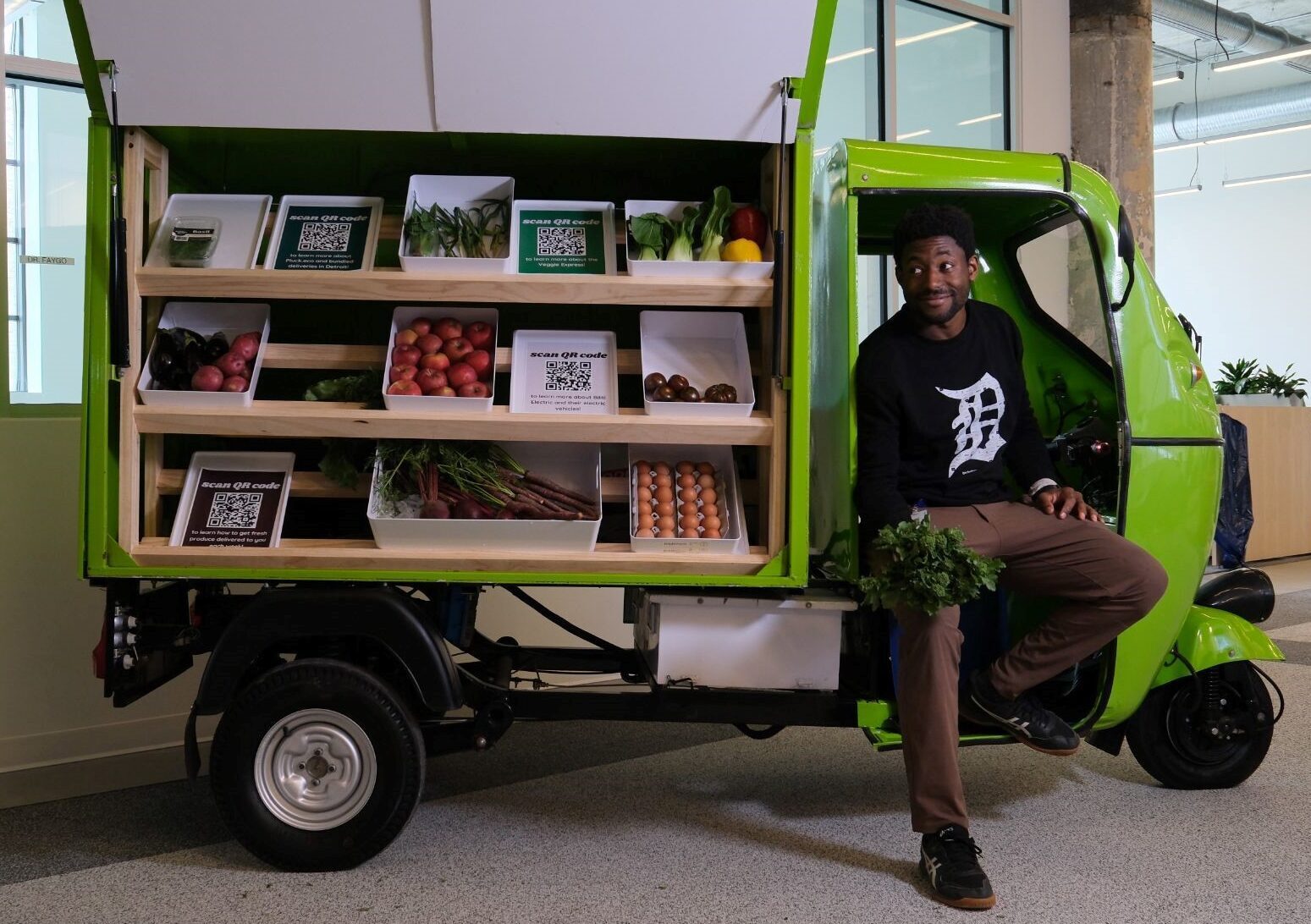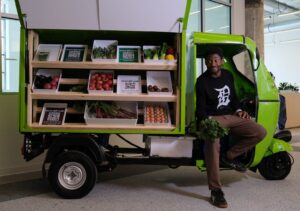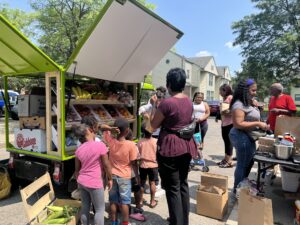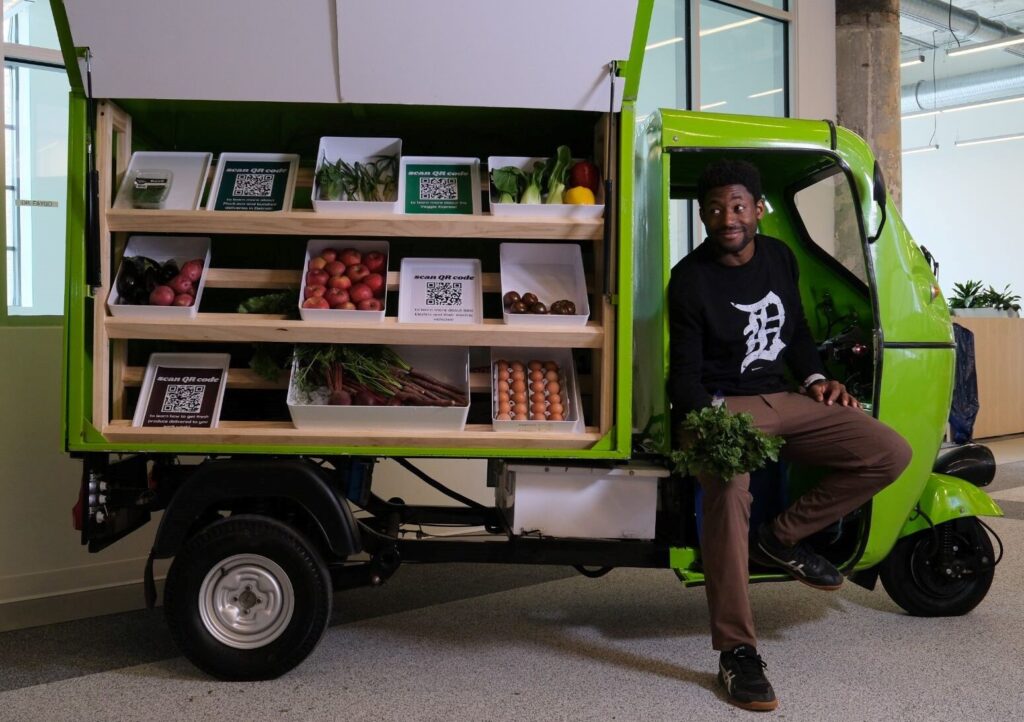Source: Special to Michigan News

Chening Duker in the Veggie Express. Photo: credit Stephen McGee, Michigan Central

Chening Duker in the Veggie Express. Photo: credit Stephen McGee, Michigan Central
Chening Duker has lived in Michigan for only 10 years or so, but in that time, he’s become committed to Detroit residents, especially those in underserved neighborhoods.
He’s dedicated to finding creative solutions to food distribution problems. The 2016 University of Michigan graduate moved here from the United Kingdom for school and has roots in Ghana and Cameroon.
While he was still in college, software engineer Duker began experimenting with technological answers to the age-old questions of food access and equity. So far, he las launched two startup projects: Pluck and its side project the Veggie Express. Both projects have help from Newlab at Michigan Central, which helps startups that address barriers to social, economic and physical mobility.
Duker’s initial project, Pluck.eco, help farmers find ways to get their produce to customers, bypassing the added expense, waste and energy loss of a grocery store. Duker estimates that at least 80 cents of every dollar that a consumer spends at a grocery stores goes to packaging, shipping, distribution and shelving, leaving narrow profit margins for the farmers who produce the food. Recognizing that sometimes getting produce to customers is the greatest challenge, Duker than launched the Veggie Express pilot project in 2019.
Veggie Express is a collaboration among Pluck.eco, local Black-owned urban farms, food distributors, and California-based EV start-up BILITI to create a sustainable, cost-effective model for the farmers to distribute produce while improving fresh food access in Detroit.
The delivery vehicle, the Veggie Express, is powered by solar energy and battery power, as part of Duker’s and Newlab’s mission of sustainability.
How did the Veggie Express get its start?
I started Pluck at the end of 2019 when I was still working for the University of Michigan. Because I am an immigrant, I didn’t yet have a Visa that would allow me to actually start a company. A year to two years of work alongside working on a visa, while I also worked part time at the university, got me to the point where I built something that was compelling enough and novel enough to warrant me getting an O-1 Visa (granted to individuals who possess extraordinary abilities in the arts, sciences, education, business or athletics).
When I started working with these farms, I thought, ‘I have a software engineering degree, I think I could create something that would help these farmers distribute more efficiently. I think I can build something that might help.’ The core innovation that that helped me get the visa was the work I did around lowering the cost of distribution for for small farms and small businesses.
How did Pluck branch off into the Veggie Express?
The Veggie Express was actually a collaborative project we did with Newlab and Michigan Central and a another company that makes a solar-powered three-wheeled vehicle. We all came together and were looking to prove out a model for making food much more sustainable and accessible. Because of my background and my company, we decided to test out this model where we would create a small grocery store on wheels and take it into different areas in Detroit, ones that have less access, or less ability to get out to the closest grocery store.

Courtesy of Michigan Central.
We wanted to bring super fresh, very high-quality produce at an affordable price to these areas. So that was the beginning of the project. It was super well-received by the residents that we were serving and so even after our pilot was over, the community we’re working with actually paid us to extend it throughout the rest of the growing season.
What neighborhoods does the Veggie Express serve?
The primary one is Clement Kern Gardens right in Corktown. It’s a mixed-residential community where you have older families and people who are low-income. And yeah, that was our that was our pilot group.
What kind of feedback did you get from the residents from the pilot program?
Two things were specific in the feedback that we got. One was that the prices were surprisingly affordable. That’s because we buy everything in season and in bulk. If we’re buying tomatoes at the peak of tomato season, the farms have so many tomatoes that it actually beats the prices you’d get at the grocery store.
The other piece of feedback was maybe less obvious: they really appreciated how much we would listen to their feedback. A resident would ask an offhanded question, like whether we had okra and the next week, we would bring okra. We we put a lot of emphasis into this cart being very community-driven. They can text us every week if they have requests. It was different from the other kind of food distribution projects that happen around Detroit, where there’s less choice, and you might just get a box of whatever is extra that week.
Can you walk us through how it works for a resident of one of the neighborhoods you serve to get the Veggie Express? How does it work?
Maybe the organization is a senior living home, maybe it’s a residential community like Clement Kerns, or maybe it’s just a neighborhood of people. If they’re interested in bringing the Veggie Express to that neighborhood on a route, we charge a fee that covers the labor of bringing the car out and selling produce for about an hour to two hours. If you live near any of these communities that are bringing out the Veggie Express, you can just come and shop when we arrive.
The shop is generally spearheaded by community leaders or employers at a large workspace that will pay for us to come in. We essentially charge at cost for all the items we sell off the vehicle. It’s kind of like a Costco membership on wheels, but fresh produce, if you can imagine that. That makes it very accessible for residents. The prices are better than they would see typically going to the grocery store themselves.
What are the benefits of the project, to the consumer and to the economic outlook in Detroit?
Since we don’t have that many full-on grocery stores in Detroit, getting very fresh food can actually be pretty hard or pretty expensive. The mission with Pluck is to replace grocery stores with farms. What that actually means is that we want to make it as easy for a farm or a small business to reach all the people in their community as it is for the people to get fresh produce.
The vehicle we’re using right now cost us almost nothing to run, which means the the markup that goes into produce that you might normally see from packaging and transport and fuel and, and transportation in general is super low. So now we can sell produce at cost and get it to people when and where they need it.


